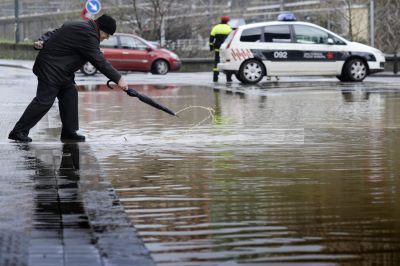2009 a 'benign' year of natural disasters: German re-insurer

We've made it through a year of relatively few natural disasters, German re-insurer Munich Re said Tuesday, but climate change is still a threat and the failed Copenhagen summit ensures costs will rise in the future.
Munich Re said natural catastrophes took many fewer lives and caused much less damage on average in 2009 than in the previous decade.
In an annual look at the cost of natural disasters, the re-insurance giant said: "Losses were far lower in 2009 than in 2008 due to the absence on the whole of major catastrophes and a very benign North Atlantic hurricane season."
It put the death toll this year at "around 10,000," well below the average of 75,000 in each of the past 10 years.
The most deadly single event as a 7.6 magnitude earthquake in Indonesia on September 30, killing nearly 1,200 people in and around the city of Padang, on the island of Sumatra.
Asian storms meanwhile killed thousands more and caused widespread damage in the Philippines, Vietnam and Taiwan.
In monetary terms, 2009 losses were also much lower than in previous years, Munich Re said.
It estimated the total economic cost this year at 50 billion dollars (35 billion euros) and insured losses at 22 billion dollars.
That compared with economic losses of around 200 billion dollars and insured losses of 50 billion dollars in 2008, one of the worst years on record, and a decade average of 115 billion and 36 billion respectively, the German group calculated.
The most expensive single event this year was Klaus, a winter storm that hit northern Spain and southwestern France on January 23-25 with winds of up to 195 kilometres an hour (122 mph).
Klaus cut power to more than one million people while causing economic losses of 5.1 billion dollars and insured losses of three billion.
Munich Re's head of geo risk research, Peter Hoeppe, warned that "the trend towards an increase in weather-related catastrophes continues."
Board member Torsten Jeworrek added that given an almost three-fold rise in weather-related natural catastrophes since 1950, "it is very disappointing that no breakthrough was achieved at the Copenhagen climate summit."
US President Barack Obama said on December 23: "I think that people are justified in being disappointed about the outcome in Copenhagen" after the UN summit ended with only vague prescriptions to curb carbon dioxide emissions.
Jeworrek said Tuesday: "We need as soon as possible an agreement that significantly reduces greenhouse gas emissions because the climate reacts slowly and what we fail to do now will have a bearing for decades to come."
While there is no reference estimate for the cost of climate change, economists say the bill will undoubtedly be in the trillions of dollars.
According to the 2006 Stern Review by British economist Nicholas Stern, an increase of between two to three degrees Celsius (3.6-5.4 degrees Fahrenheit) over pre-industrial times would cut world output by up to three percent.
Australia escaped disaster before Christmas when Cyclone Laurence slammed mainly uninhabited regions of the country, but officials say western residents are now threatened by towering wildfires fanned by "catastrophic" conditions.
Subscribe to Independent Premium to bookmark this article
Want to bookmark your favourite articles and stories to read or reference later? Start your Independent Premium subscription today.

Join our commenting forum
Join thought-provoking conversations, follow other Independent readers and see their replies